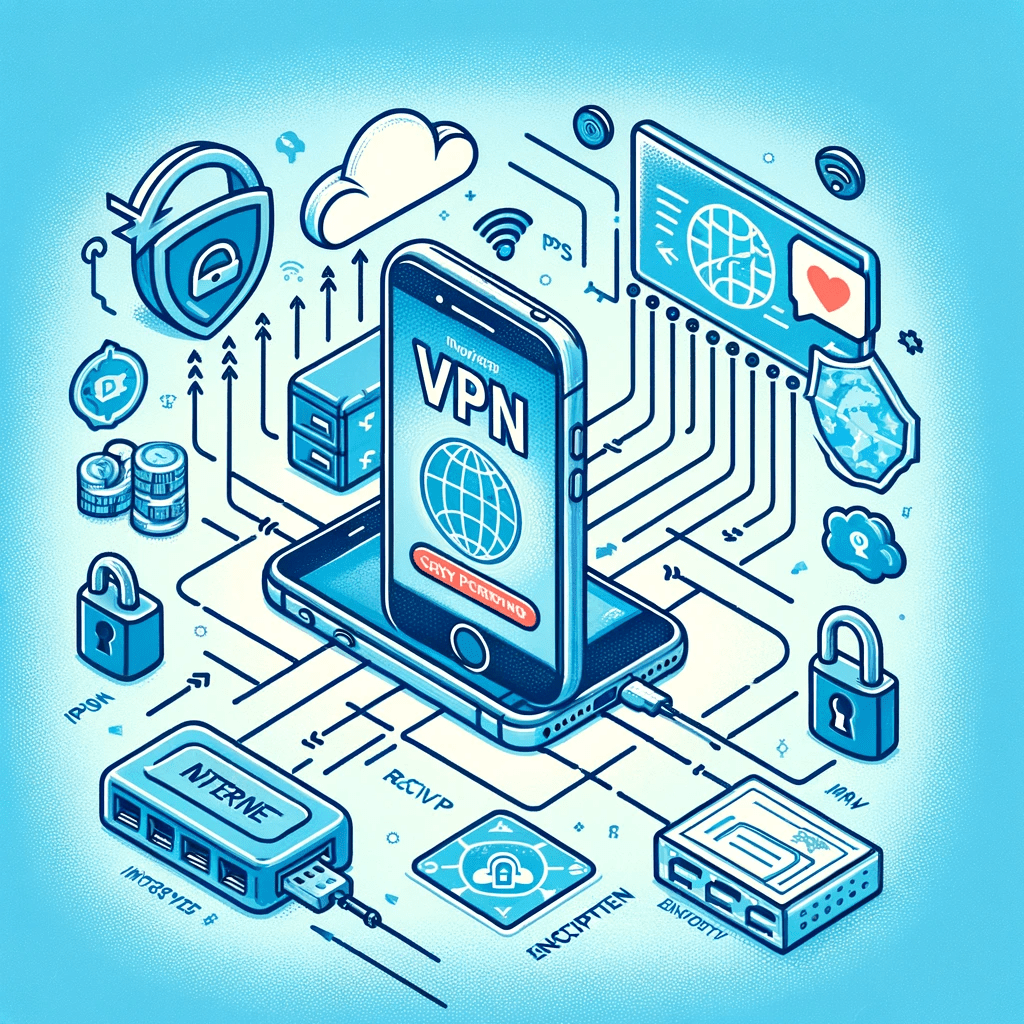In the current digital landscape, where online privacy and security are paramount, understanding and using “VPNs for iPhone security” is essential. This article focuses on “iPhone VPN usage” and how to utilize Virtual Private Networks to secure your internet connection on your iPhone, offering an additional layer of security.
VPNs for iPhone Security
What is a VPN?
A Virtual Private Network (VPN) extends a private network across a public network, enabling users to send and receive data as if their devices were directly connected to the private network. This provides increased online privacy and security, making VPNs a critical tool for “secure internet on iPhones.”
Basic Concept of a VPN
Using VPNs for iPhone Security improves privacy and security, but what exactly is a VPN?
- Encryption: VPNs encrypt your internet traffic, which means that all the data you send and receive through the internet is converted into a code that can only be deciphered with the right ‘key’. This process helps protect your data from being intercepted and read by unauthorized parties.
- Tunneling: When you connect to a VPN, it creates a ‘tunnel’ – a private, secure path between your device and the internet. This tunnel goes through the public internet but keeps your data secure from outside access due to its encryption.
- Masking IP Address: A VPN masks your IP address, the unique number assigned to your internet connection. When you use a VPN, the internet sees the IP address of the VPN server instead of your personal IP address, enhancing your online anonymity.
How VPNs Work
- Initiating a Connection: When you activate a VPN on your device, it communicates with a VPN server, usually operated by a VPN service provider.
- Data Encryption: Before any data leaves your device, it is encrypted by the VPN software.
- Data Transmission: The encrypted data is sent over the internet to the VPN server.
- Decryption and Access to Internet: The VPN server decrypts the data and sends it to the intended internet destination, such as a website or an online service.
- Response Back Through VPN: The process is reversed for incoming data from the internet – it’s sent first to the VPN server, where it is encrypted and then sent back to your device.
Benefits of Using a VPN
- Enhanced Security: VPNs provide a significant level of security, especially when using public Wi-Fi networks, making it difficult for hackers to intercept your data.
- Privacy Protection: By masking your IP address and encrypting your data, VPNs protect your online activities and prevent tracking by ISPs or other entities.
- Bypassing Geo-Restrictions: VPNs can help access content that is geographically restricted by connecting to servers in different countries.
Why Use a VPN on Your iPhone?
Why should you use VPNs for iPhone Security?
- Privacy Protection: A VPN encrypts your internet traffic, protecting your online activities from being monitored or tracked by ISPs or other entities.
- Secure Public Wi-Fi Use: Using a VPN on public Wi-Fi networks, like those at coffee shops or airports, can prevent cybercriminals from intercepting your data.
- Accessing Restricted Content: VPNs can allow you to access content that may be restricted in certain geographical regions, including websites and streaming services.
How to Set Up a VPN on Your iPhone
- Choose a VPN Provider: Select a reputable VPN service provider. Consider factors like security features, server locations, and user reviews.
- Install the VPN App: Download and install the VPN provider’s app from the App Store.
- Configure VPN Settings: Open the app and follow the instructions to configure the VPN settings on your iPhone. Apple provides a helpful guide on VPN configuration on its support site.
- Connect to a VPN Server: Once set up, you can connect to a VPN server. The app typically allows you to choose a server location and connect with a simple tap.
Best Practices for VPN Usage on iPhone
- Always-On VPN: Ensure your VPN is always active, especially when connecting to public Wi-Fi networks.
- Regularly Update VPN App: Keep your VPN app updated to benefit from the latest security enhancements.
- Use Strong Authentication: Choose VPN providers that offer strong authentication methods.
Select a VPN Provider
Here we selected 3 providers of VPNs for iPhone Security.
- Windscribe: Windscribe has been known for offering a free VPN service with a generous amount of monthly data and a range of server locations. You can check their current offerings at their website: Windscribe.
- ProtonVPN: ProtonVPN offers a free VPN service, emphasizing privacy and security. They are known for having no data limit on their free plan, which is relatively unique among free VPN services. Visit ProtonVPN for more information.
- TunnelBear: TunnelBear provides a user-friendly VPN service with a free option that includes a monthly data cap. It’s known for its ease of use and clear privacy policies. Their website TunnelBear will have more details.
Additional Resources
For a comprehensive understanding of iPhone security and how VPNs fit into your overall digital security strategy, check out our Complete Guide to iPhone Security. You can also explore more about cybersecurity in the security section of our blog.
VPNs for iPhone security – Conclusion
VPNs play a crucial role in enhancing your iPhone’s internet security, offering both privacy and protection in the digital world. By understanding and implementing a VPN on your iPhone, you can safeguard your online activities and enjoy a more secure digital experience.



